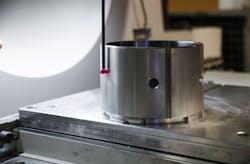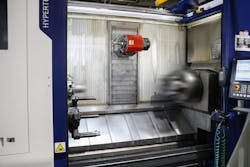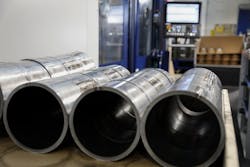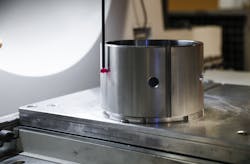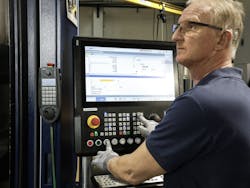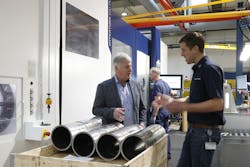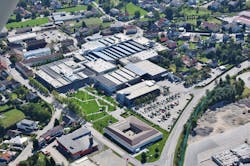EMCO's HYPERMILL Creates Complete Process Machining of Plain Bearing Bushings for Wind Turbines
Sustainability In Energy Production
Wind power has become more socially relevant in recent years, and it contributes significantly to the energy transition. However, wind farms need to become even more efficient in order to conserve resources. This is precisely where Miba Gleitlager Austria GmbH comes in with its hydrodynamic bearings for wind turbines.
Miba uses a large number of HYPERTURN 100 Powermill turn-mill centers by EMCO to machine the required plain-bearing bushes.
Miba Gleitlager Austria GmbH, based in Laakirchen (Upper Austria), is one of the world’s leading manufacturers of engine bearings for large engines, compressors, and turbines. With the hydrodynamic bearings produced by Miba, performance enhancements can be gained compared to conventional rolling bearings.
Bearings for Wind Energy
Wind power is a beacon of hope and a source of clean energy. For more than five years, the company has also been working on bearing solutions for the gearbox in wind turbines.
“Thanks to our comprehensive knowledge in the application of technology and materials, we can also offer customized and cost-effective bearing solutions for wind turbines beyond the limits of other bearing technologies," says Ing. Wolfgang Stadlmayr, Project Manager at Miba Gleitlager Austria GmbH, explaining the development step.
But wind turbines are also affected by the market economy and must be as efficient as possible which also increases the technological demands on wind turbines.
“Upcoming turbines will be designed for twice the production output. However, there’s no longer any need to increase installation space. Traditionally, used rolling bearings can hardly cope with these requirements, if at all," says Stadlmayr. Plain bearings have a very compact design, an increased power density, a higher load capacity, noise-reduced operation, as well as simple assembly, lower maintenance requirements, and increased service life.
“Due to the increasingly growing demand for energy, existing wind farms are being expanded and new ones built—particularly in China, but also worldwide. In order to be able to satisfy this high demand, we have massively increased our production capacities for wind bearing production,” continues the project manager, who is primarily responsible for machine selection and process development in the field of renewable energies.
The design of the HYPERTURN 100 Powermill with a powerful main and counter spindle, a B-axis with direct drive for complex 5-axis simultaneous machining, and an additional lower turret system offer the possibility of complete machining of complex components for the company's scaled production.
“Together with EMCO, we were able to convert the manufacturing process for our Miba wind-bearing bushes to process-reliable complete machining and thus significantly optimize it," says Stadlmayr.
The plain-bearing bushes are made of composite material and are used in applications with diameters from 5 to 20 in. (125 to 500 mm).
Several HYPERTURN 100 Powermill turning-milling centers are in operation in the Austrian plant to produce plain-bearing bushes reliably and economically, as well as one in the production plant in China.
“More are already on order so that we can cover the enormous demand on-site, especially in Asia,” Stadlmayr reveals. The Upper Austrians have a long-standing partnership with EMCO, as they invested in the first HYPERTURN series from EMCO 20 years ago. “In total, Miba has already ordered 14 turning-milling centers from EMCO, many of them partially or fully automated. And almost all of them are still in use," says Rupert Lehenauer, sales manager at EMCO GmbH.
Miba deliberately does not award any turnkey projects but leaves the know-how in-house. “In this way, we always remain independent and can implement every project exactly according to our ideas,” explains Stadlmayr.
Flexibility Required
This was also the case with the production design of the plain bearing bushes for the wind industry.
“Basically, the project involved a certain risk for us, because we didn’t know for sure whether we would be able to manufacture the bushes with the necessary tolerances and surface qualities in a process-safe manner,” the project manager continues. That’s why Miba was looking for a partner who, in addition to the technical requirements, was as flexible as possible.
Naturally, several potential machine manufacturers were contacted and in the end, EMCO turned out to be the optimal partner for Miba once again. “On the one hand, we knew about the quality and reliability of the HYPERTURN series from many years of experience, and on the other hand, EMCO agreed to implement the concept we had planned one-to-one and thus also to share the risk to a certain extent,” says Stadlmayr, explaining the decision in favor of the machine tool manufacturer from Hallein.
Miba designed the clamping device concept, which consists of standard and special clamping devices, internally. For the bushings to be machined as accurately as possible, internal clamping is essential, among other things, so that the component is not deformed. “We had to take the specially designed clamping situation into account when planning our HYPERTURN 100 Powermill and install it accordingly,” continues Lehenauer, who has been supporting Miba for more than 20 years, and who has also served as an interface to development and application technology in this special project.
Sophisticated Complete Machining
For machining, the unmachined part is inserted into the HYPERTURN by the machine operator. Both the outer and inner diameters are machined completely automatically on the main and counter spindles with the milling spindle and a lower tool turret. After complete machining, the finished components are measured externally on a coordinate measuring machine. “In this way, we can keep the specified tolerances in the micrometer range for the required diameters. For the wall thickness, we make a compromise between the necessary process reliability and the lowest possible weight,” Stadlmayr goes into detail.
Incidentally, before the project started, the entire process was simulated internally on a HYPERTURN 690 as realistically as possible before the project in order to obtain a certain degree of safety. Acceptance then took place at EMCO in Italy, where around 30 components were manufactured and checked. “The first machining operations in Italy were satisfactory right from the start—all checks were positive, the process worked, and the specificities were given,” recalls Stadlmayr.
Today, the manufacturing process runs around the clock on several identical HYPERTURN 100 Powermills. “The modular design with a powerful main and counter spindle at a maximum spindle distance of 130 in. (3,300 mm), a B-axis with direct drive for complex 5-axis simultaneous machining, as well as an additional lower turret system offers the possibility of the complete machining of complex components with a turning diameter of up to 20 in. (500 mm),” Lehenauer points out.
The machine bed is of monobloc construction. This stable and compact construction as a traveling column principle is filled with polymer concrete, absorbs vibrations that can occur during machining correspondingly well and thus supports precision work on the workpiece. "All guideways are implemented with large-dimension, preloaded linear guides with glass scales. Rollers instead of balls further increase stability and damping while being more robust,” Lehenauer elaborates on other design features.
Productivity Significantly Increased
By further developing the manufacturing process for wind bearings to include complete machining, Miba was able to significantly increase productivity. The tooling technology was designed by Miba and a long-standing partner, and the processes were successively optimized and fully developed.
“Currently, our machining time is already below what we’d expect. This all the more shows that the HYPERTURN is very powerful, but also stable and highly accurate,” concludes Wolfgang Stadlmayr, full of praise.
The Miba Group develops and produces mission-critical components for applications along the entire energy value chain. This makes an important contribution to the efficient and sustainable generation, transmission, storage, and use of energy. The products—sintered components, engine, and industrial bearings, friction materials, power electronic components, and coatings—are in vehicles, trains, ships, aircraft globally, power plants, refineries, compressors, industrial pumps, and wind turbines.
